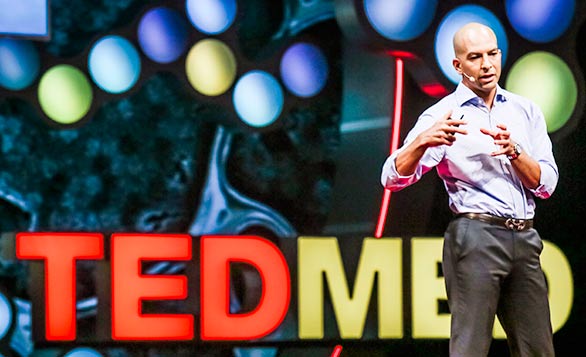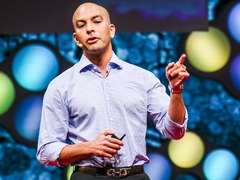
Peter Attia gives a talk that brought the house down at TEDMED 2013.
Surgeon Peter Attia sees a disconcerting paradox at work when it comes to our health: while people are talking about eating healthily and exercising perhaps more than ever, we’re seeing no reduction in the rates of obesity and diabetes. As it stands, more than 8% of Americans are diabetic and an additional 26% are pre-diabetic — which represents a 400% increase since 1970. The answer to this riddle is not simply that people are lazy or unable to follow through on what they know is best for them. Attia wonders if, perhaps, our medical understanding of the relationship between obesity and diabetes may be wrong.
 Peter Attia: Is the obesity crisis hiding a bigger problem?
In today’s powerful and personal talk, given at TEDMED 2013, Attia shares why he thinks the relationship may not be as simple as being overweight leads to increased risk of diabetes. To explain, he tells a story of a night in 2006 when he was doing his surgical residency at Johns Hopkins Hospital and was paged at 2am to see a woman with a diabetic ulcer on her foot. She was in danger of needing an amputation.
Peter Attia: Is the obesity crisis hiding a bigger problem?
In today’s powerful and personal talk, given at TEDMED 2013, Attia shares why he thinks the relationship may not be as simple as being overweight leads to increased risk of diabetes. To explain, he tells a story of a night in 2006 when he was doing his surgical residency at Johns Hopkins Hospital and was paged at 2am to see a woman with a diabetic ulcer on her foot. She was in danger of needing an amputation.
“Looking back on that night, I’d love so desperately to believe that I treated that woman with the same empathy and compassion that I’d shown the 27-year-old newlywed who’d come to the ER three nights earlier with lower back pain that turned out to be advanced pancreatic cancer. I passed no judgment on her — obviously she had done nothing to bring this on herself,” says Attia. “So why was it just a few nights later that as I stood in this same ER and determined that my diabetic patient did indeed need an amputation, why did I hold her in such bitter contempt?”
The answer: this woman had Type 2 diabetes and was obese. Running through Attia’s mind was the idea that, if she had just watched what she ate and exercised a little, she wouldn’t be in this position.
Three years later, however, Attia’s framework shifted. Despite eating well and exercising often, he began to gain weight himself. He developed metabolic syndrome, a pre-cursor to diabetes in which a person becomes insulin resistant. He started to question the assumptions he and the majority of the medical community made about diabetes. He wondered: could it be that insulin resistance caused obesity and not the other way around? Could it be that, in the same way a bruise forms in order to protect the body after an injury, that gaining weight is a coping mechanism for a deeper problem at the cellular level?
“What if we’re fighting the wrong war—fighting the obesity rather than insulin resistance? Even worse, what if blaming the obese means we’re blaming the victims? What if some of our fundamental ideas about obesity are just wrong?” asks Attia in this talk. “If we’re willing to be wrong, to challenge the conventional wisdom with the best experiments science can offer, we can solve this problem.”
Attia’s talk comes out just as a study was published in The New England Journal of Medicine that revealed a surprising result. The study randomly assigned more than 5000 overweight patients with Type 2 diabetes either a lifestyle intervention that promoted weight loss or standard diabetes support. After 13.5 years of observation, patients who did the intervention had been hospitalized less often than those in the control group and measured better on “secondary” measures. But they fared no better than the control group when it came to heart attacks, death from cardiovascular causes, and nonfatal strokes — leading the trial to be stopped. It’s a study that shows these interacting health issues may not work in the ways we’ve assume.
To hear Attia’s hypothesis about this connection and to hear his call for us to test all theories rigorously in order to save lives, watch his talk. And below, read excerpts from a Facebook Q&A that Attia did last week with the TEDMED community.
Sound Body Sound Mind Foundation asked:
What do you think is the greatest cause of obesity?
Attia responds:
The greatest cause of obesity may be that we’re applying the wrong treatment. For about 40 years, health authorities have been telling people struggling with obesity to do the same thing over and over again: eat less and exercise more. This does not appear to be successful. This would suggest that either this treatment is incorrect or it is correct and no one can follow it. Either way it’s probably time for a new treatment.
Courtney Olean Paige asks:
How does the quality of our current knowledge of the role of nutrition compare to the quality of our knowledge in other areas of health?
Attia answers:
The short answer is “poor.” The slightly more nuanced answer is that it is poor because it is very difficult to evaluate nutritional interventions in humans. Unlike laboratory mice, for example, controlling for intake and behavior is very difficult when human subjects live in a free environment. Complicating this further, most studies that try to evaluate human subjects in a free living environment are unable to adequately measure what the subjects are consuming. So the net result has been perhaps a greater reliance on epidemiology or poorly controlled studies than would be ideal in other fields of health.
Nicole Batiste asks:
Why does nutrition seem like such an unimportant subject for so many scientists in the health and medical space?
Attia responds:
This is an important question and I can only provide a peanut gallery response. I think nutrition science falls into a little bit of a no man’s land. On the one hand, it is expensive to do properly the way, for example, major drug research is done. On the other hand, there is no great opportunity to monetize the results through intellectual property. So there’s a bit of a funding void. While everyone would agree that it’s probably more important that we know what to eat to be healthy than to know which drug to take to improve condition X, the economic forces appear to be conspiring against this elucidation.
Scott McCollum asks:
What are your thoughts on the gut microbiome and obesity? Where’s the current research at and where is it headed?
Attia responds:
The current body of evidence certainly suggests that the gut biome plays a role not only in obesity, but more importantly insulin resistance and metabolic dysregulation. Perhaps one of the most amazing clinical observations is the amelioration of diabetes in patients undergoing gastric bypass prior to losing any weight post surgery. This at least suggests that the weight loss per se is not the issue in type two diabetes. Rather, something in the gastric bypass may be altering flora in the gut, which may in fact be altering the underlying insulin resistance. The most interesting question form my vantage point is this: Can the benefit of gastric bypass on the insulin resistant patient be achieved through a dietary intervention that also interrupts the gut biome? Stay tuned.
Brian Burke aks:
The public perception that fat is bad is so engrained that most people don’t remotely question it. It’s hard to get people on board when one of our main points is that the U.S. government is recommending outdated information. To the average person, I sound like a conspiracy nut. What does the general public need to hear to think differently?
Attia responds:
My belief is that it is not at all a conspiracy, though I understand why it may appear as one. Rather, I think it’s an example of how inconclusive science coupled with confirmation bias and selection bias has reinforced itself over a generation. Whether dietary fat or any particular type of dietary fat (e.g., saturated fat) is harmful needs to be addressed by rigorous prospective experimental trials. This is exactly the type of science that the Nutrition Science Initiative [the nonprofit of which Attia is president and co-founder] hopes to facilitate.
Karyn Toso asks:
Is there such a thing as “food addiction”? And that people with such “addiction” need to stay away from certain foods (sugar, flour, etc.) completely, much as an alcoholic cannot even have a single drink?
Attia answers:
Karyn, there is a lot of evidence suggesting that certain types of food (it may be different foods for different people) do elicit a brain chemistry response virtually indistinguishable from that elicited by known addictive stimulants such as gambling or opiates. What’s a little sad to contemplate is that this may not be a coincidence, and may in fact be the direct result of industrial process of food chemistry.
Dana Schmidt adds:
I am wondering if we can limit the amount of high fat, high salt and high fructose corn syrup. One thought it not being able to purchase any of these products with food stamps. What are your thoughts on that?
Attia answers:
At some point there will be a role for policy intervention in combating metabolic diseases. However, the biggest mistake that could happen in the short term would be, in my opinion, a policy intervention that is not grounded in rigorous science. In fact, it was exactly this desire to leap to policy change prior to conclusive science that, I believe, set us on the path to where we are today. So before we consider placing limits on food purchased with food stamps, I think it’s worth taking the time to know exactly what the health implications are of the choices we give people. Unfortunately, this requires doing a great amount of scientific work.
Read the full Q&A with Attia on Facebook »
Comments (26)
Pingback: Insulin Resistance Explained | Lincoln, NE Biological Dentist
Pingback: Fatso… and other lousy adjectives… – lmrn4jr-Random neural firings
Pingback: Wednesday’s Interests: – aDailyInterest.com
Pingback: What’s Wrong With Mainstream Western Medicine — Part IV | The Sustainabilitist
Pingback: Is the obesity crisis hiding a bigger problem? | alferjani80